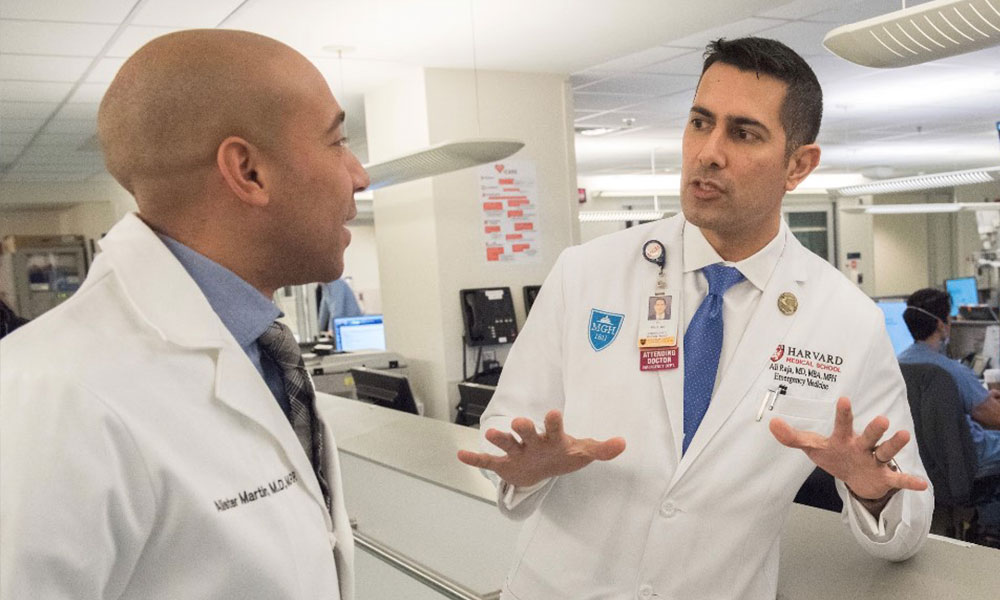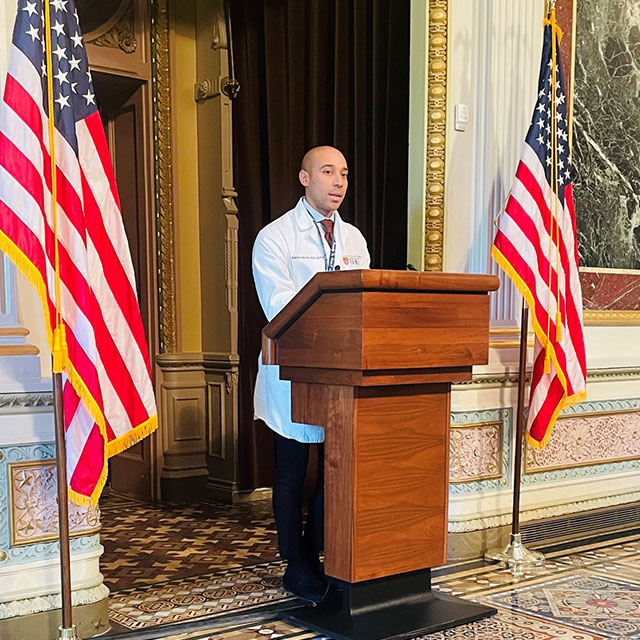News3 Minute ReadApr | 15 | 2023
A new phase of the opioid epidemic: MGH emergency physicians celebrate removal of the X-Waiver requirement


During one of his first shifts at Mass General, Alister Martin, MD, MPP, MGH Emergency Medicine physician, encountered a patient in the Emergency Department who would ultimately change the course of his career. After suffering a severe ankle fracture that required surgery, the patient became addicted to the opioid pain medication oxycodone and came to the hospital seeking help after failing to find an available detox facility.
“She didn’t choose or want that life for herself,” Martin says. “But, at the time, even the most kind, compassionate, intelligent emergency physicians didn’t have the resources or authority to help with addiction recovery. And this wasn’t just a Mass General problem – every emergency department in the country was experiencing this.”
One of the main obstacles emergency clinicians were facing in caring for patients with opioid use disorder was the inability to prescribe the drug buprenorphine. To prescribe it for addiction treatment, clinicians were required to hold an additional license called
the X-Waiver.
Ali Raja, MD, deputy chair, Department of Emergency Medicine, the only MGH emergency physician to have the X-Waiver at the time, says that while it was important for him to have, the hospital didn’t yet have the infrastructure in place for him to easily use it.
“We didn’t have a program set up with Pharmacy, and it was cumbersome for us to train other clinicians to get their X-Waivers,” Raja says. “For something like this to work, an entire multidisciplinary team of clinicians, nurses and pharmacists have to be on board and trained.”
To get more clinicians licensed, Martin created a program called Get Waivered – a grassroots effort to educate more clinicians in Mass General’s Emergency Department about the X-Waiver and the impact it could have on the lives of their patients. The department quickly went from one waivered physician – Raja – to 46.
Thanks to funding from the National Institutes of Health, Martin was able to take the program across the country and help more than 5,000 more physicians get waivered throughout the past 6 years.
“The magic of Alister is his ability to grow an idea from a grain of sand all the way to an entire beach,” Raja says. “He really hit it out of the park when it came to getting clinicians excited about treating patients with opioid use disorder.”
Martin’s work didn’t stop there.
“It still wasn’t enough,” Martin says. “We eventually started focusing on additional advocacy efforts to get the X-Waiver requirement removed altogether. The opioid epidemic is like wildfire, and just having that extra obstacle felt like trying to put those fires out with an eyedropper.”

In December 2022, those advocacy efforts materialized when U.S. President Joe Biden
signed a bill into law to remove the X-Waiver requirement. Martin and emergency physicians across the country felt as though a “light was being turned on in a dark room” when, overnight, the number of clinicians who could prescribe buprenorphine in the United States increased from 130,000 to 1.8 million. Martin was invited to the White House on Jan. 24, 2023, with other national leaders to share information about the work of Get Waivered and to call on additional clinicians to join him in providing treatment for addiction.
“This is going to make a huge difference for patients across the country,” Raja says. “There are so many places where physicians, nurse practitioners and physician’s assistants didn’t have the time or money get the X-Waiver, but now, every hospital in the country will be able to treat these patients.”
Moving forward, Martin says it will be important to continue educating providers and encouraging them to use their prescribing authority for patients with an opioid use disorder.
“Luckily, Mass General has been a leader in this space for a long time,” Martin says. “But now, we can really encourage physicians to talk with their patients about opioid use disorder, ensuring them that we’re the kind of people who can and want to help.”
